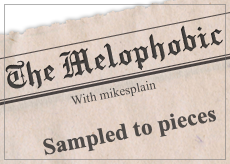The Melophobic: Sampled To Pieces
posted in: Features
There has long been a debate in the music industry regarding the use of sampled music. Some people are convinced that under the Fair Use law parts of songs that are open to the public may be used in new creations without compensation. The truth is, Fair Use often doesn’t apply. The law is so vague it can be determined what Fair Use is on a case-by- case basis. The usage of copyrighted material without paying of royalties is not only illegal but can cause many issues in the future.
In 1998 the Verve debuted their hit single “Bitter Sweet Symphony” in the United States. The song reached Number 12 on the the Billboard Hot 100 chart prior to a dispute regarding a legally-obtained sample used throughout the piece. During production, it was negotiated that the sample heard throughout the work would require a 50/50 split on royalties. The sample was taken from a cover version of an original work by the Rolling Stones. Although not a direct infringement on the original work, it was decided that 100% of the royalties should be given to the Rolling Stones.
These days, it’s common practice to sample other artists in genres such as hip hop, rap and R&B, however it must be done legally. Many young artists with little financial stability ignore licensing, which is not only illegal but a perfect way to forge enemies in the industry.
Think about it. Here on OurStage, we often run contests with artists such as John Legend, T-Pain, and Bow Wow. Lets say you entered your song into one of the competitions and it contained a few illegally obtained samples. When the artists listens to the song, if they hear something illegal, it’s not only a complete turn off to the song but a liability to be selected as a winner (which is why we are forced to remove many songs containing samples).
With artists like Girl Talk focusing on the exclusive re-creation of previously published works by re-arranging and modifying pre-recorded sounds, sampling will surely be an issue long into the future. It is important for you to protect yourself by purchasing correct licensing for any samples used in your songs. Obviously, the easiest thing would be to avoid sampling completely by generating all original sounds on a record. Not only will this let you avoid legal issues but it will also allow you to take full control of your royalties (versus one of those nasty splits required for sampling). More royalties equals more money, more money equals stronger career? Well, let’s save that one for another day.

